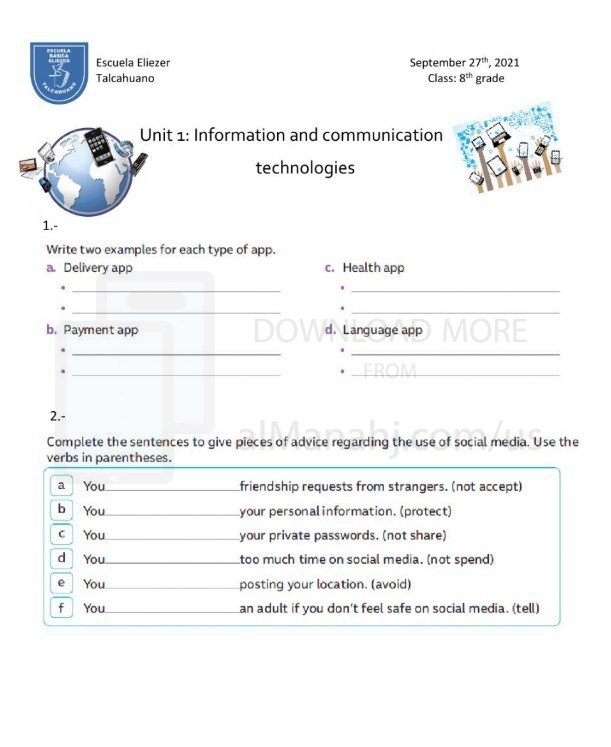| You are here: Almanahj Website ⇒ American curriculum ⇒ 8th Grade ⇒ Information and comm ⇒ Term 1 | ||
|---|---|---|
Worksheet about Information and communication technology | ||
|---|---|---|
| Subject: Information and comm | ||
| 8th Grade | ||
| Term 1 | ||
| Year: 2023/2024 | ||
| Size: 312.5KB | ||
| Number of clicks: 116 | ||
| Publish date:November 16, 2023 | ||
| Added by: Eman | ||
| Last download date: 2024-08-28 00:11:43 | ||
| Updated by: Eman9966 on 2023-11-16 14:51:18 | By: theodor Miss_Natalia | |
| File info: Information and communication technology (ICT) is a broad term that encompasses the use of computers, telecommunications, and other electronic devices to store, retrieve, transmit, and manipulate data. ICT has revolutionized the way we communicate, work, and live, and it continues to shape the world around us in profound ways. Key Components of ICT: Computing: Computers are the central processing units of ICT, capable of storing, processing, and retrieving data. They come in various forms, including desktops, laptops, tablets, and smartphones. Telecommunications: Telecommunications technologies enable the transmission of data over long distances. They include wired and wireless networks, such as telephone lines, cellular networks, and satellite communications. Networking: Networking technologies connect computers and devices, enabling them to share information and resources. They include protocols like TCP/IP, Ethernet, and Wi-Fi. Software: Software applications are the programs that run on computers and devices, providing specific functionalities. They range from operating systems to web browsers, productivity suites, and games. Applications of ICT: ICT plays a vital role in almost every aspect of modern life, including: Communication: ICT has transformed communication through email, messaging platforms, social media, and video conferencing. Information Access: The internet provides access to a vast repository of information, enabling research, learning, and entertainment. Business and Commerce: ICT has revolutionized business operations through e-commerce, supply chain management, and customer relationship management. Education and Learning: ICT has transformed education through online learning platforms, interactive resources, and personalized instruction. Healthcare: ICT has revolutionized healthcare through electronic health records, telemedicine, and medical imaging technologies. Entertainment and Leisure: ICT has revolutionized entertainment with streaming services, virtual reality experiences, and video games. Government and Public Services: ICT is used to deliver public services, manage infrastructure, and engage with citizens. Benefits of ICT: ICT offers numerous benefits to individuals, businesses, and society as a whole: Increased Efficiency and Productivity: ICT automates tasks, streamlines processes, and improves communication, leading to increased efficiency and productivity. Global Connectivity and Collaboration: ICT connects people worldwide, enabling collaboration, cultural exchange, and global problem-solving. Enhanced Access to Information and Education: ICT provides access to a vast repository of information and educational resources, promoting lifelong learning and bridging knowledge gaps. New Business Opportunities and Economic Growth: ICT has created new industries, enabled innovation, and driven economic growth. Improved Public Services and Governance: ICT can improve the delivery of public services, enhance transparency, and facilitate citizen engagement. Challenges and Ethical Considerations: While ICT offers immense benefits, it also presents challenges and ethical considerations: Privacy and Security Concerns: The collection and storage of personal data raise concerns about privacy and the potential for misuse. Digital Divide and Inequality: Unequal access to ICT can create a digital divide, exacerbating existing social and economic inequalities. Cybersecurity and Data Protection: Cybersecurity remains a critical issue, protecting data and ensuring the integrity of digital systems. Ethical Implications of Artificial Intelligence: The development and use of artificial intelligence raise ethical questions about bias, decision-making, and potential harm. Impact on Employment and Job Displacement: Automation and technological advancements may lead to job displacement, requiring retraining and adaptation. | ||
| Downloading link Worksheet about Information and communication technology |
|---|
|
1700133033.pdf
The file is being prepared for download
|
| File images |
|---|
 |